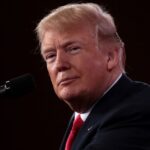


President-elect Donald Trump announced on Tuesday the establishment of a novel governmental body, the "External Revenue Service," aiming to transform how international tariffs and duties are collected in the U.S.
Breitbart reported that this new agency is set to launch on January 20, 2025, as part of Trump's first-day agenda, and its main function will be to gather financial resources from foreign sources linked to trade activities.
In a Truth Social post, Trump introduced this development, sparking discussions about trade and tax reforms under his administration.
The establishment of the External Revenue Service marks a significant divergence from the traditional Internal Revenue Service (IRS) and targets revenue streams from international commerce rather than domestic taxation.
The presidential announcement came with a clear objective: to obligate foreign entities benefiting from American trade to contribute fairly to the nation's coffers.
Trump's communication underscored his belief that current trade agreements inadequately serve the U.S. economy. By focusing on international revenue, he anticipates reshaping the U.S. economic landscape.
"For too long, we have relied on taxing our Great People," Trump said, mentioning the IRS. He elaborated on the inadequacies of past trade agreements, suggesting they had irresponsibly prioritized global prosperity over domestic growth.
The rollout of the External Revenue Service is positioned as a centerpiece of Trump's day-one administrative plans. January 20, 2025, is slated as the launch date, and with it, the anticipated initiation of a new stream of revenue collection targeting international profits.
To many observers, the initiative represents a shift in the philosophy underpinning America’s revenue collection strategies. Trump's rhetoric highlighted a quest to ensure foreign traders contribute aptly to U.S. economic fortification.
At a recent event, Trump revealed more elements of his near-term policy goals. Speaking at Turning Point USA’s AmericaFest in Phoenix, he delineated additional objectives to be pursued on the first day of his administration.
Among these objectives is the introduction of executive orders addressing issues like border security and energy production. Trump emphasized moves to “close the border to illegal aliens” and initiate a "mass deportation operation" as pivotal to securing national borders.
Another focus area in his agenda is curbing practices he associates with "child sexual mutilation" and removing certain ideologies from military and educational domains. Trump’s plans include ending specific instructional policies related to gender in schools and the military, which he views as detrimental.
Moreover, he aims to reverse many of the energy-related regulations set during President Joe Biden's tenure. By removing these restrictions, Trump seeks to stimulate domestic energy production and reduce dependency on external resources.
Through these initiatives, Trump paints a picture of rigorous economic and cultural realignment. The collection of trade-based revenues is expected to coexist alongside these domestic policies, positioning the External Revenue Service as a tool for bolstering America's financial footing.
In making the announcement, Trump reiterated the significance of the new agency’s debut. He stated, "January 20, 2025, will be the birth date of the External Revenue Service," signaling a departure from how America has previously approached taxation and trade engagement.
For many, the design and implementation of this new agency suggest a restructuring of government revenue systems that have historically been reliant on domestic taxation. The focus on global trade as a fiscal resource marks a pivotal change from previous administrations.
Trump’s assertion that this agency will ensure foreign sectors "pay their fair share" illustrates his intent to recalibrate the economic scales, positioning the U.S. more advantageously on the global stage.



